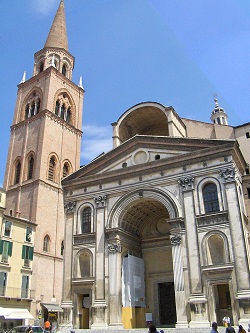Born:
c.1489; Correggio, Italy
Died:
March 5, 1534; Correggio, Italy
Active Years:
1510 - 1534
Nationality:
Italian
Art Movement:
High Renaissance, Mannerism (Late Renaissance)
Field:
painting, fresco
Influenced by:
Lorenzo Allegri, Francesco Bianchi, Lorenzo Costa, Francesco Francia, Andrea
Mantegna, Leonardo da Vinci
Influenced on:
Giovanni Maria Francesco Rondani, Parmigianino, Bernardino Gatti, Giorgio
Gandini del Grano
Teachers: Francesco Bianchi
"Antonio Allegri da Correggio", also known as "Correggio", born in around 1489 and died on March 5, 1534, was the premier painter of the Parma school of the High Italian Renaissance. He has contributed to some of the most vigorous and sensuous works of the 16th century.
Correggio foreshadowed the Baroque art
of the 17th century and the Rococo art of the 18th century in the use of
dynamic composition, illusionistic perspective and dramatic foreshortening. He
is also considered a master of “chiaroscuro”, creating art works using strong
contrasts between light and dark.
 |
Sacred and Profane Love, a sample for chiaroscuro, Giovanni Baglione |
He
was born in Correggio, a small town near Reggio Emilia in Italy. Little is
known about Correggio's early life and art education, but he is presumed to
have received his first art education from his father's brother and painter
Lorenzo Allegri.
He became a student of Francesco Bianchi in Modena from 1503 to 1505, where he seems to have become familiar with the classicism of artists such as Lorenzo Costa and Francesco Francia.
 |
| Crucifixion with St Jerome and St Francis, Francesco Bianchi |
 |
| The Adoration of the Child, Francesco Francia |
After a trip to Mantua in 1506, he returned to Correggio, where he stayed until 1510. During the period, he painted the "Adoration of the Child with St. Elizabeth and John," apparently influenced by Lorenzo Costa and Andrea Mantegna.
 |
| Adoration of the Child with St. Elizabeth and John, Correggio (c.1510) |
In 1514, he seems to have completed three "tondos" for the entrance of the church of Sant'Andrea in Mantua, after which he returned to Correggio and contracted to paint the Madonna altarpiece at the local monastery in St. Francis.
 |
| Basilica of Sant'Andrea, Mantua |
Correggio
died suddenly in his hometown on March 5, 1534. The following day after his
death, he was buried in San Francesco in Correggio, near his youthful
masterpiece the "Madonna di San Francesco," now housed in Dresden,
but the precise location of his tomb is currently unknown.
 |
| Madonna di San Francesco, Correggio (1514-1515) |
A mysterious and eclectic artist, he was influenced by Lorenzo Costa, Andrea Mantegna and Leonardo da Vinci as well. His works are now considered to have been revolutionary and influential on subsequent artists.
 |
| Holy Family, Lorenzo Costa |
 |
| Annunciation, Leonardo da Vinci (c.1472–1475) |
 |
| Madonna with the Cherubim, Andrea Mantegna (c.1485) |
Correggio had no direct disciples outside of Parma, where he was influential on the works of Giovanni Maria Francesco Rondani, Parmigianino, Bernardino Gatti, and Giorgio Gandini del Grano.
 |
Portrait of bearded man with feathered, Giovanni Maria Francesco Rondani |
 |
| Bardi Altarpiece, Parmigianino (c.1521) |
 |
| The crucifixion, Bernardino Gatti |
FAMOUS WORKS (Correggio)
 |
Adoration of the Child with St. Elizabeth and John (c.1510) |
 |
Adoration of the Christ Child (c.1526) |
 |
Adoration of the Magi (c.1515–1518) |
 |
Allegory of Vice (c.1531) |
 |
Allegory of Virtue (c.1525-1530) |
 |
| Ganymede Abducted by the Eagle (c.1531-1532) |
 |
| Head of Christ (1525–1530) |
 |
| Judith and Her Maidservant (1510–1514) |
 |
| Jupiter and Io (c.1530) |
 |
| Leda and the Swan (c.1530–31) |
| Madonna and Child with Saint George (c.1530) |
Madonna and Child with Sts Jerome and Mary Magdalen (c.1528) |
| Madonna and Child with the Infant John the Baptist (1518) |
Thank you.










No comments:
Post a Comment